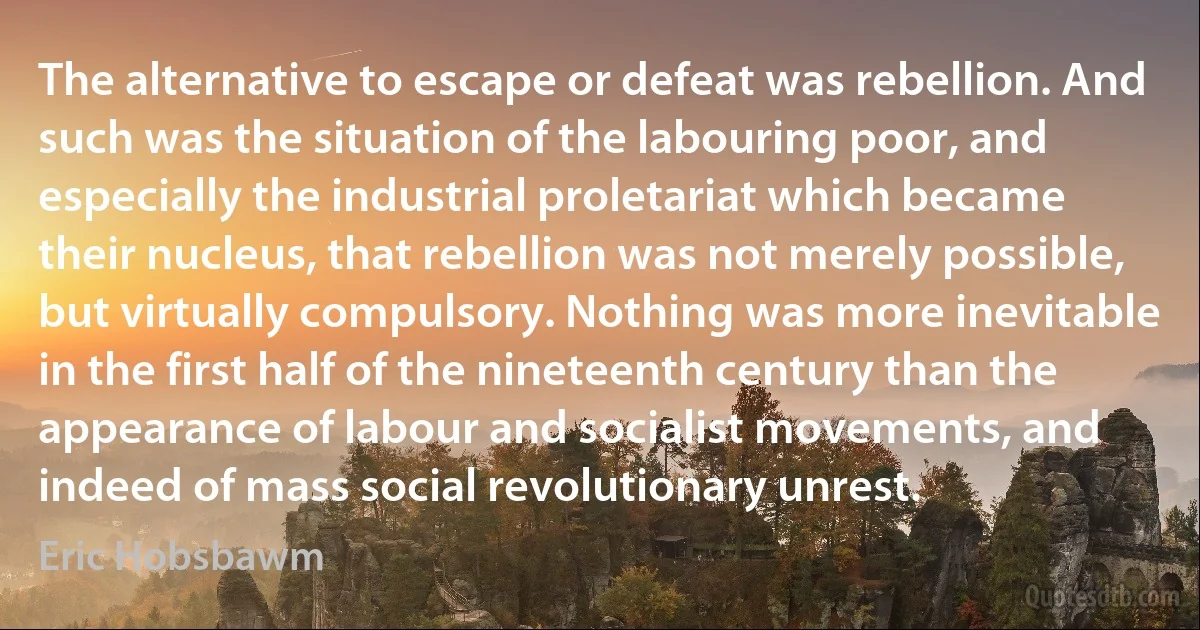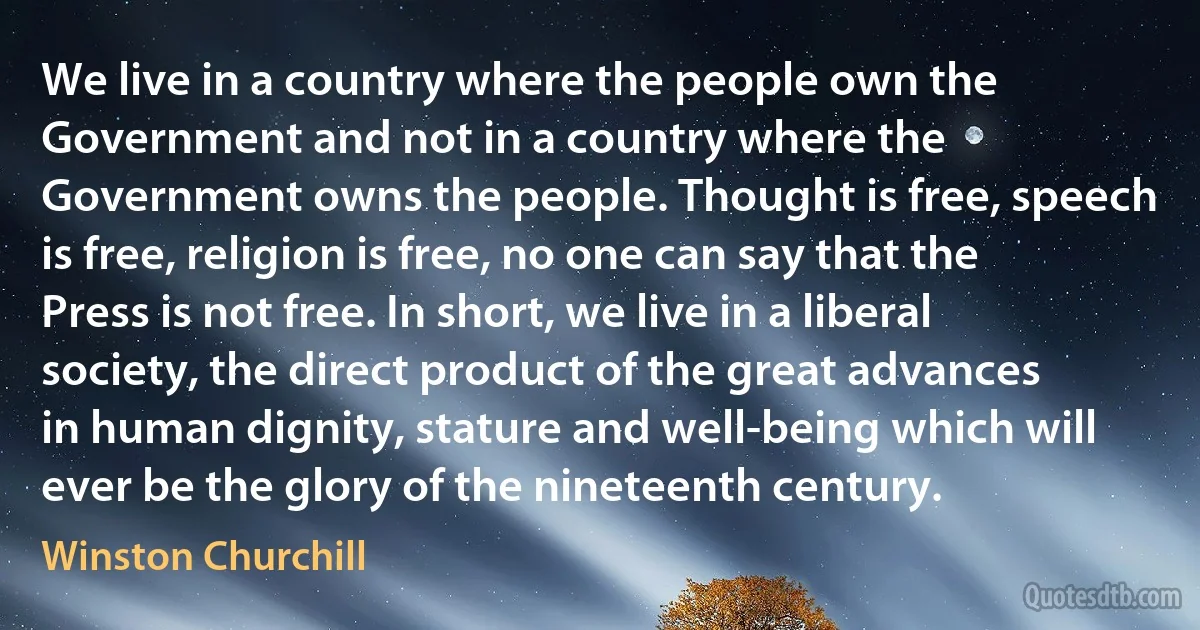Nineteenth Quotes - page 10
In 1979, with changing technology, I wrote and produced a video on the life and times of Eugene Victor Debs that was sold to colleges around the country. Debs was a great American who played an enormously important role in our history, but he was unknown to most people. He was one of the leading trade union leaders of the late nineteenth century, the founder of the American Socialist Party, and a six-time candidate for president of the United States. In 1920, he received nearly 1 million votes for president while he was in jail for his opposition to World War I. Many of the ideas that Debs campaigned on were later adopted by FDR and incorporated into the New Deal. Today, I have a plaque of Debs on a wall in my Senate office.

Eugene V. Debs
As capitalism and bourgeois society triumphed, the prospects of alternatives to it receded, in spite of the emergence of popular politics and labour movements. These prospects could hardly have seemed less promising in, say 1872–3. And yet within a very few years the future of the society that had triumphed so spectacularly once again seemed uncertain and obscure, and movements to replace it or to overthrow it had once again to be taken seriously. We must therefore consider these movements for radical social and political change as they existed in the third quarter of the nineteenth century.

Eric Hobsbawm
Neutrality toward Spinoza set in once one was able to admit that the "modern worldview," whose victory was decisively aided by Spinoza's metaphysics, does not, or does not entirely, coincide with this metaphysics. But even at this stage it was still generally maintained, and even emphasized, that among the three great Western philosophers of the seventeenth century - Descartes, Hobbes, and Spinoza - Spinoza was the most important one because, he was the most progressive one. He alone had drawn certain consequences from the foundations of modern philosophy, which became fully clarified only in the nineteenth century and which henceforth determined the general consciousness.

Baruch Spinoza
The Dutch carried vanilla to Indonesia, and the British to India. "Tincture of vanilla” didn't appear in the United States until the 1800s, but when it did, it appealed to the American impatience and aversion to fuss, that sprint through life whose byword is convenience. Europeans use the vanilla bean, luxuriating in its textures, tastes, and aromas, but we preferred it reduced and already bottled. By the nineteenth century, demand flourished, vanilla became synthesized, and the world floated on a mantle of cheap flavoring.

Diane Ackerman
Does anybody now believe in the story of the serpent? I pity any man or woman who, in this nineteenth century, believes in that childish fable. Why did Adam and Eve disobey? Why, they were tempted. By whom? The devil. Who made the devil? God. What did God make him for? Why did he not tell Adam and Eve about this serpent? Why did he not watch the devil, instead of watching Adam and Eve? Instead of turning them out, why did he not keep him from getting in? Why did he not have his flood first, and drown the devil, before he made a man and woman. And yet, people who call themselves intelligent-professors in colleges and presidents of venerable institutions-teach children and young men that the Garden of Eden story is an absolute historical fact. I defy any man to think of a more childish thing. This God, waiting around Eden-knowing all the while what would happen-having made them on purpose so that it would happen, then does what? Holds all of us responsible, and we were not there.

Robert G. Ingersoll
For four hundred years the human race has not made a step but what has left its plain vestige behind. We enter now upon great centuries. The sixteenth century will be known as the age of painters, the seventeenth will be termed the age of writers, the eighteenth the age of philosophers, the nineteenth the age of apostles and prophets. To satisfy the nineteenth century, it is necessary to be the painter of the sixteenth, the writer of the seventeenth, the philosopher of the eighteenth; and it is also necessary, like Louis Blane, to have the innate and holy love of humanity which constitutes an apostolate, and opens up a prophetic vista into the future. In the twentieth century war will be dead, the scaffold will be dead, animosity will be dead, royalty will be dead, and dogmas will be dead; but Man will live. For all there will be but one country-that country the whole earth; for all there will be but one hope-that hope the whole heaven.

Victor Hugo
Two aphorisms about Rembrandt's paintings were drawn from his early biographies and repeatedly attributed to the artist by the French writers: 'A painting is finished when the artists says that it is finished' and 'A painting is not made to be sniffed', but contemplated from a distance.. .These paintings were identified with the latter years of Rembrandt's life, the period in which critics said he suffered most from financial pressures and a lack of public acclaim. Works identified with these final years were the most popular in France during the last decades of the nineteenth century.

Rembrandt
In seventeenth- and eighteenth-century France, race was already a weapon in the struggle between absolutism, aristocracy, and the middle class. The warfare spread to the arts and philosophy in the nineteenth century, by which time independent shoots in other cultures had also borne fruit, leaving the grand harvesting on a world-wide scale to our generation.
Viewed in the light of such facts, the race question appears a much bigger affair than a trumped-up excuse for local persecution. It becomes rather a mode of thought endemic in Western civilization. It defaces every type of mental activity - history, art, politics, science and social reform.

Jacques Barzun
[T]he nineteenth century was under the illusion that citizenship can take care of itself. It thought that a free society was "natural" and... would maintain itself by its own momentum. ..."[A]utomatic progress" would preserve liberty. ...[T]hese beliefs were false... they were destructive. They are not... the source and origin of Hitlerism, but they greatly facilitated its rise.

Peter Drucker
But when we come to consider the problem of party positively-by what attracts... the aspect is dismal in every party alike, whether we put our hopes in measures or in men. ...The historic party questions of the nineteenth century are as dead as last week's mutton; and whilst the questions of the future are looming up, they have not yet become party questions, and they cut across the old party lines.

John Maynard Keynes
Before the nineteenth century, writers on education portayed the "improvement of mind" as an activity mainly suited to gentlemen. ...both Thomas Jefferson and Benjamin Rush had venerated David Rittenhouse as an example of how arduous philosophical investigation might elevate the child of humble parents. But Jefferson and Rush tagged Rittenhouse as a genius, and hence untypical, and each employed Rittenhouse as ammunition in a debate among educated gentlemen. Jefferson invoked Rittenhouse in his Notes on the State of Virginia, a book he wrote to disabuse French philosophes of the notion that all specied degenerated in the New World; Rush used his eulogy of Rittenhouse before the select audience of the American Philosophical Society to ridicule colleges for requiring students to learn the ancient languages.

David Rittenhouse
The possibilities of the art of combination are not infinite, but they tend to be frightful. The Greeks engendered the chimera, a monster with heads of the lion, the dragon and the goat; the theologians of the second century, the Trinity, in which the Father, the Son and the Holy Ghost are inextricably tied; the Chinese zoologists, the ti-yiang, a vermilion supernatural bird, endowed with six feet and four wings, but without a face or eyes; the geometers of the nineteenth century, the hypercube, a figure with four dimensions, which encloses an infinite number of cubes and has as its faces eight cubes and twenty-four squares. Hollywood has just enriched this vain museum of horrors: by means of an artistic malignity called dubbing, it proposes monsters that combine the illustrious features of Greta Garbo with the voice of Aldonza Lorenzo.

Jorge Luis Borges
The implications of Descartes' analytic reformulation of geometry are obvious. Not only did the new method make possible a systematic investigation of known curves, but, what is of infinitely greater significance, it potentially created a whole universe of geometric forms beyond conception by the synthetic method.
Descartes also saw that his method applies equally as well to surfaces... but he did not develop this. With the extension to surfaces, there was no reason why geometry should stop with equations in three variables; and the generalization to systems of equations in any finite number of variables was readily made in the nineteenth century. Finally, in the twentieth century, the farthest extension possible in this direction led to spaces of a non-denumerable infinity of dimensions. ...The path from Descartes to the creators of higher space is straight and clear; the remarkable thing is that it was not traveled earlier than it was.

René Descartes
As hunger and hardship increase, the world may see more than one wave of more than one disease. If and when an influenza pandemic emerges, for instance, many AIDS sufferers will succumb, but people infected with the AIDS precursor, HIV, will still survive influenza and AIDS will march on. India, for example, was among the hardest-hit nations in the 1918 flu pandemic. Today it has among the highest rates of AIDS infection. The age-old human enemies, tuberculosis, malaria, cholera, streptococcus, and other members of the familiar gang will be on hand with new immunity to the old techno-tricks of the [nineteenth and] twentieth centur[ies]. Even after these diseases may have spent themselves for a while, climate change [which in turn could create new diseases] will still be with us. Nobody really knows where that is taking us, though we do know that the human race has endured more than one ice age in the past.

James Howard Kunstler


